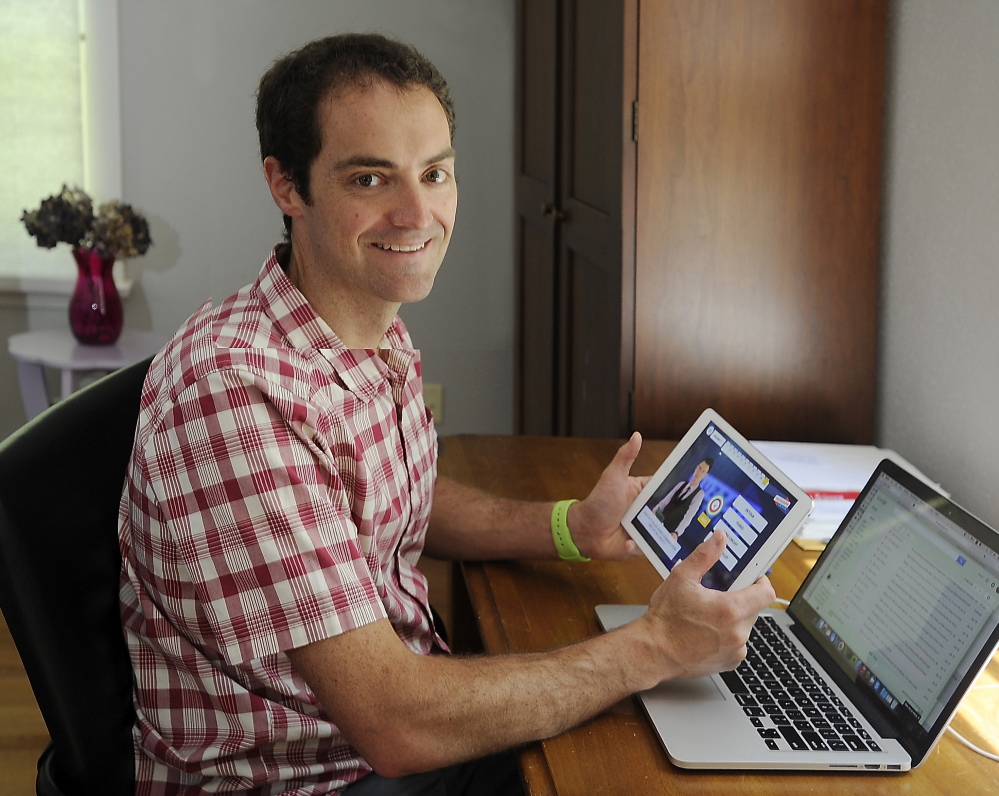Although it sounds sinister, Jason Cianchette happily accepts the mantle of serial entrepreneur. The Falmouth native said he has a naturally curious personality and a desire to learn new things, apply what he’s learned to start a company and then move on.
It didn’t start out that way – after graduating from Tufts University, he worked for Accenture, a huge consulting firm.
“That’s not exceptionally entrepreneurial, with 150,000 people,” he said, but he learned about business and launched, with some friends, a startup called “Somebody Loves Me,” that was selling care packages to be sent to college students.
“It was a disaster,” Cianchette said, but he still learned some lessons that he was eventually able to apply to his own company when he started Liquid Wireless, now just Liquid, in 2008. It developed marketing campaigns aimed at mobile phone users and he sold the company three years later to Publishers Clearing House for an undisclosed amount. He has since started Huzzapp, a company that is developing video that is interactive and changes based on a user’s responses. The company has developed a prototype, based on a trivia game, in which the “host’s” responses change, based on the user’s answers. For instance, the game might ask what would the national bird be if Ben Franklin had had his way? If the user chooses “turkey” the app’s host response doesn’t just say, “Correct,” but interacts with the user and encourages him or her to try the next question. After each successive answer, a profile of the user emerges, providing valuable user data. Perfecting that technology to use in mobile advertising is the basis for Huzzapp. Cianchette said he also has some other interests that he might soon turn into startups in Portland.
Q: How did you hit on the idea behind Huzzapp?
A: After leaving Liquid, I was looking around for different opportunities and a big emerging area is video on mobile devices. I was shocked that of 20 people I worked with (at Liquid), none of them had cable. The audience is moving very quickly to mobile devices and consuming video content on mobile devices. So I thought about how video could be different with this technology. Video has been linear – it started at a certain time and it would run and then it would be over. Now we have it on-demand and it can start at any time, but you can pause it and that’s about it. So I thought of how that could relate to advertising. Basically, the way commercials run on YouTube is the same way they ran on “I Love Lucy.” The hope is to make that more interactive and more engaging.
Q: How do you make money from that?
A: I don’t know yet. We made a pilot app with a concept of daily trivia contest. Now, we’re hoping to apply that to advertising and other entertainment. For example, if you’re Jeep and you want to advertise to me, you should talk to me differently because I own a Jeep. So the conversation changes.
We’ve been building the technology out and now we’re in the process of identifying ways to commercialize it and find partners where it could be most readily used.
Q: Does that mean you’re ready to move on?
A: I’m naturally restless and like to push stuff forward. Huzzapp is my current focus but I’ve got a couple of other ideas percolating. One is to make a fundraising app for peer-to-peer loans because I personally make a lot of loans with Lending Club and Prosper (two firms that bring together companies seeking to borrow and investors willing to lend) and my thought is to make a fund to help other investors do it. I’m also working with a friend who’s a commercial real estate developer to help that field use more data technology.
Q: Why does moving on frequently appeal to you?
A: My two favorite things are learning and teaching and, with a new opportunity, it’s exciting to learn. It’s almost like there’s a brand-new game that no one’s played before and it’s great to learn how to play it and do it well. I like that aspect, the competition and the learning and, as a manager, I like teaching others how the games are played. But I get to the point where that’s repetitive and I’m ready to learn the next game.
Q: Is Maine a good place for someone like you to follow that model?
A: Maine’s good at some parts of that, with a modest cost of living and a lot of very talented young people who are eager to learn. At my last company, we hired a lot of people right out of Bowdoin and Colby (colleges) and taught them how they can learn new games, but there aren’t a lot of people around to have conversations with about where the next games are being played. In other parts of the country, like in California, that’s what people are talking about. Here, those kinds of conversations aren’t taking place as much.
Q: Why are those conversations important?
A: It gets people thinking about those issues and getting exposed to new ideas. Most inspiration isn’t from a single person, but from a collection of people looking at a problem in different ways. That leads to inspiration.
Q: And Maine isn’t so great at fostering those conversations?
A: A lot of people in Maine are very friendly and open – it’s basically a big town – so you have connections to a lot of people. That’s a really positive aspect, but a lot of people are also risk-averse. They’re easy to engage and talk to about stuff, but harder to get them to quit their great job and go on and do it with you.
Send questions/comments to the editors.




Comments are no longer available on this story